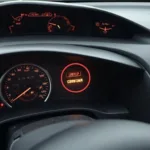Experiencing an OBD2 link error when trying to connect your scanner to your Honda? You’re not alone. This is a common frustration for many Honda owners, often leading to confusion and wasted time. This article will delve into the common causes of OBD2 link errors in Honda vehicles and provide a step-by-step guide to help you diagnose and resolve the issue.
Common Causes of OBD2 Link Errors in Hondas
Before diving into solutions, it’s crucial to understand the potential reasons behind the dreaded “link error” message on your OBD2 scanner. Here are some common culprits:
- Faulty OBD2 Scanner: It might seem obvious, but a malfunctioning scanner can be the root of the problem. Always ensure your scanner is in good working order and compatible with your Honda model.
- Loose or Damaged OBD2 Port: The physical connection between your scanner and the car’s OBD2 port is crucial. Inspect the port for any bent or damaged pins, and make sure the connector is securely seated.
- Blown Fuse: A blown fuse related to the OBD2 system can interrupt communication. Consult your owner’s manual to locate the appropriate fuse and check for any breaks.
- Wiring Issues: Damaged or corroded wiring within the OBD2 system can also disrupt communication. This often requires more in-depth inspection and repair.
- Software Issues: In some cases, outdated software in your OBD2 scanner or even your vehicle’s computer system can cause communication problems.
Troubleshooting OBD2 Link Errors
Now, let’s move on to some practical steps to tackle that pesky link error:
- Check Your OBD2 Scanner: Begin by testing your scanner on a different vehicle to rule out any scanner-related issues. If the scanner works fine on another car, the problem lies with your Honda.
- Inspect the OBD2 Port: Locate your Honda’s OBD2 port, usually situated under the dashboard on the driver’s side. Carefully examine the pins for any damage or debris. Use a can of compressed air or a soft brush to clean the port if necessary.
- Check the Fuse: Consult your owner’s manual for the location of the OBD2-related fuse. Remove the fuse and inspect it for any breaks in the wire. Replace the fuse if it’s blown.
- Inspect the Wiring (Advanced): Caution: Proceed with caution as this step involves handling electrical components. If you suspect wiring issues, it’s best to consult a qualified mechanic. However, if you have experience with automotive electrical systems, you can visually inspect the wiring harness leading to the OBD2 port for any signs of damage or corrosion.
Still Facing Issues?
If the troubleshooting steps above don’t resolve the issue, it’s highly recommended to consult with a qualified mechanic or a Honda dealership. They have the expertise and specialized tools to diagnose and repair more complex OBD2 link errors, such as software-related problems or internal electrical faults.
Tips for Preventing Future OBD2 Link Errors
Prevention is always better than cure. Here are some tips to minimize the chances of encountering OBD2 link errors in the future:
- Handle your OBD2 scanner and port with care: Avoid dropping or mishandling the scanner, and ensure the connector is securely plugged into the port.
- Regularly inspect the OBD2 port: Periodically check the port for any dirt, debris, or signs of damage.
- Keep your Honda’s software updated: Check for any available software updates from Honda, as these updates often include improvements for the OBD2 system.
best ios obd2 bluetooth scanner: For iOS users seeking a reliable OBD2 scanner, explore our recommendations for the best iOS-compatible bluetooth scanners.
Conclusion
While encountering an OBD2 link error with your Honda can be frustrating, understanding the potential causes and following the troubleshooting steps outlined in this article can help you get to the root of the problem. Remember, if you’re unsure about any step or the issue persists, seeking professional help is always the safest option.
FAQs
Q: Can I drive my Honda with an OBD2 link error?
A: While an OBD2 link error itself might not prevent your car from running, it indicates a potential issue with the diagnostic system. It’s essential to diagnose and resolve the error to ensure all systems are functioning correctly.
Q: Is it safe to disconnect the battery to reset the OBD2 system?
A: Disconnecting the battery can sometimes clear temporary glitches, but it’s crucial to consult your owner’s manual or a qualified mechanic before attempting this.
Q: How often should I check my OBD2 port?
A: It’s a good practice to inspect your OBD2 port at least twice a year or whenever you experience any issues with your vehicle’s electronics.
is my vehicle obd2 compliant: Not sure if your vehicle is OBD2 compliant? Visit our comprehensive guide to determine your vehicle’s compatibility.
Common Scenarios and Questions
Scenario: My scanner worked fine yesterday, but now it’s showing a link error. What could have changed?
Possible causes: A blown fuse, a loose connection at the OBD2 port, or even a temporary glitch in the vehicle’s electrical system.
Question: Can a low car battery cause an OBD2 link error?
Answer: Yes, a significantly low battery voltage can sometimes disrupt communication between the scanner and the vehicle’s computer.
Need further assistance?
Contact us via WhatsApp: +1(641)206-8880, Email: [email protected]. Our dedicated customer support team is available 24/7 to assist you with any OBD2-related inquiries.
